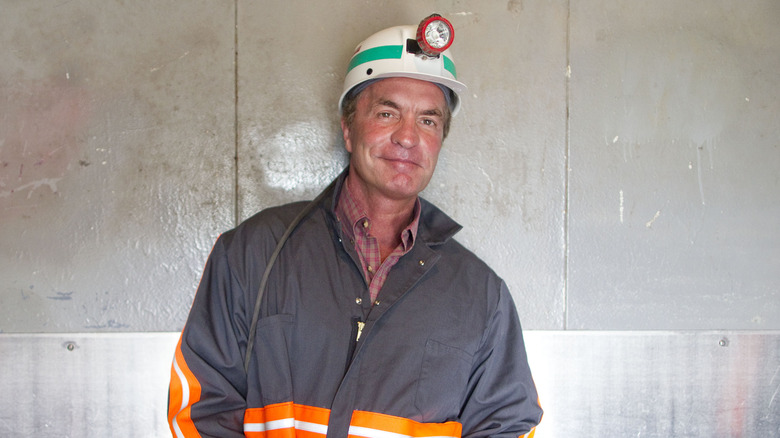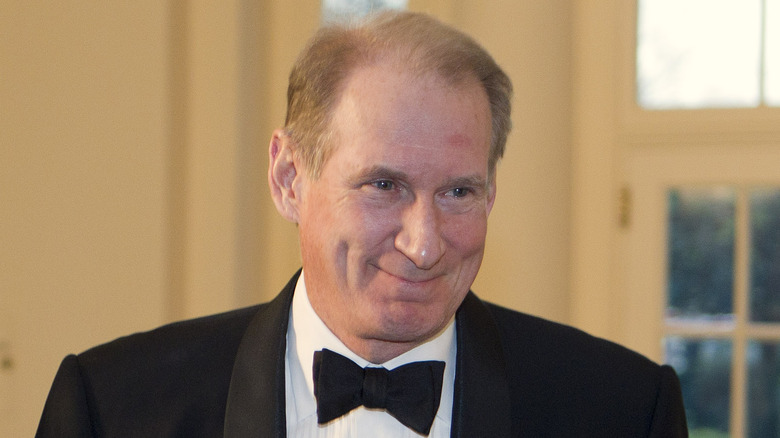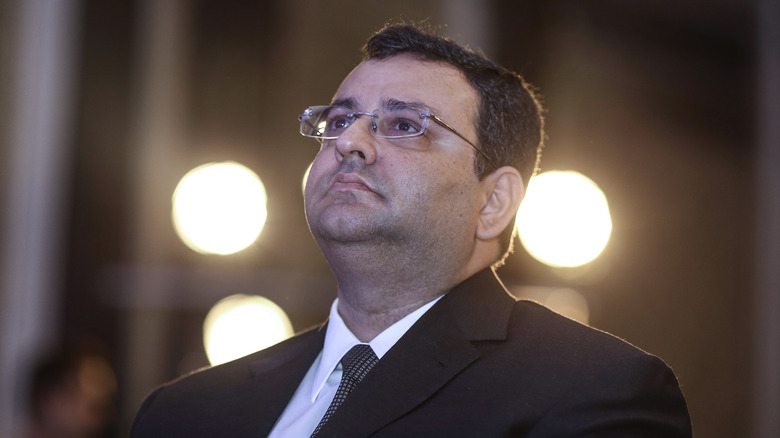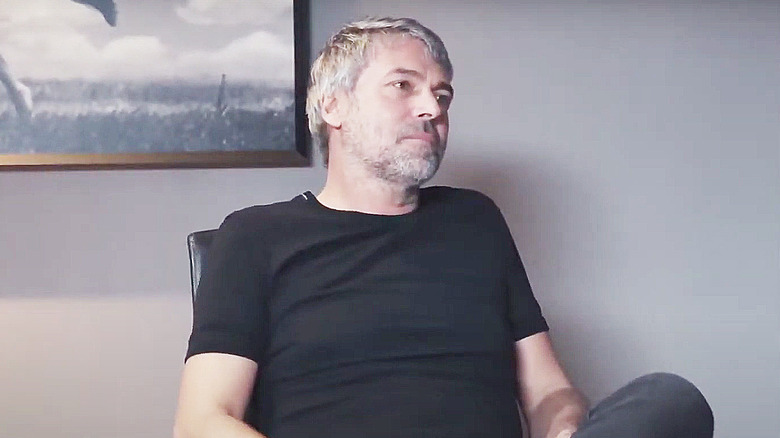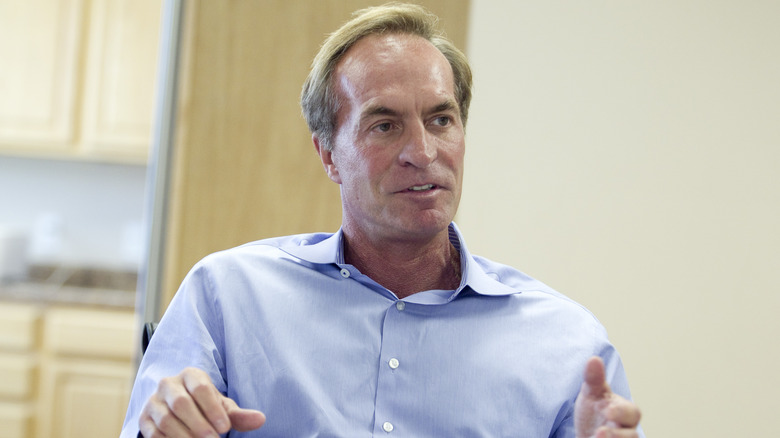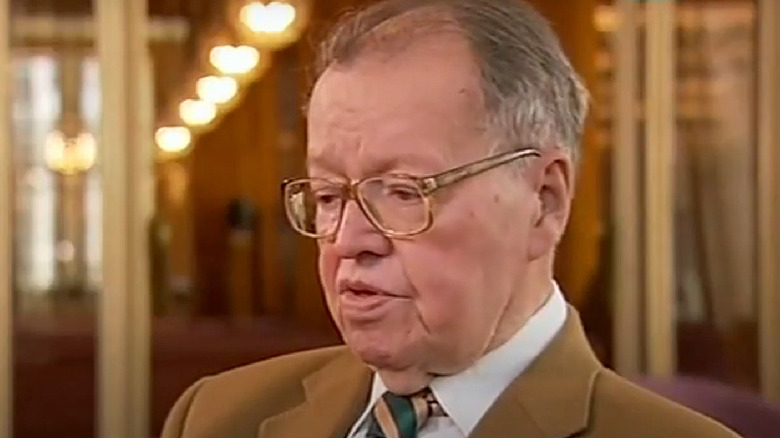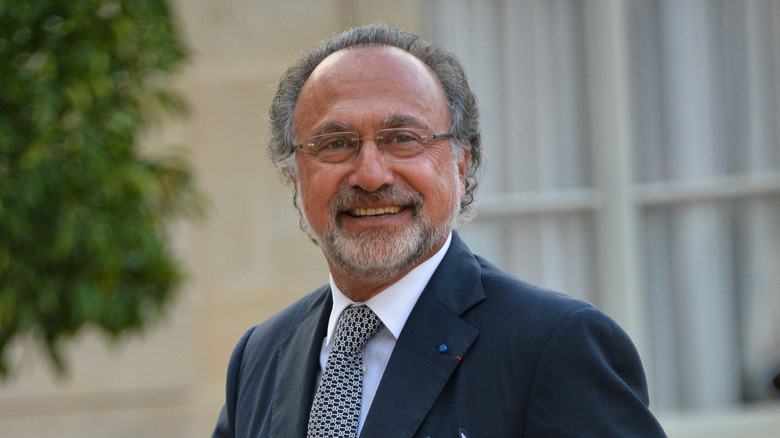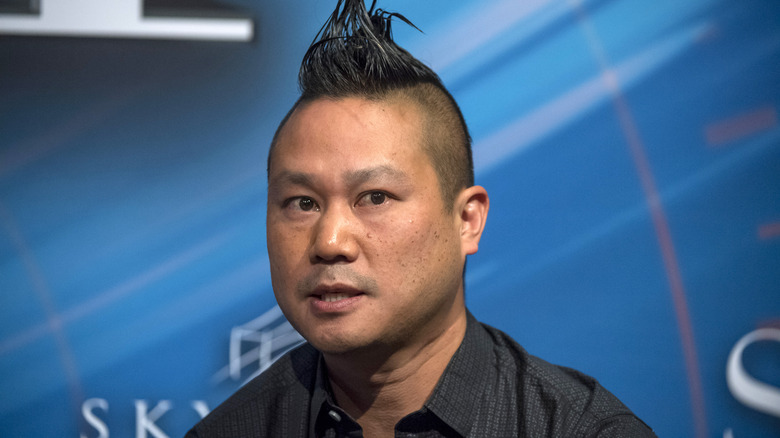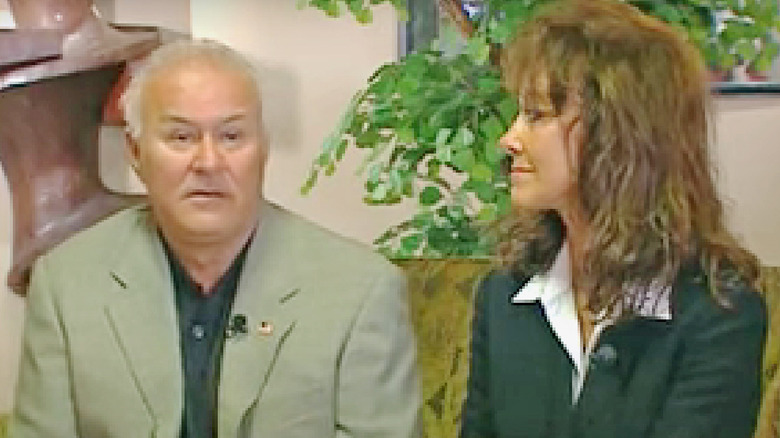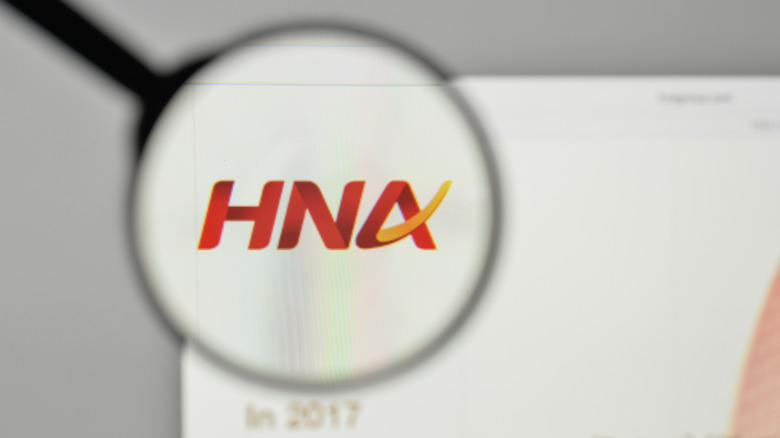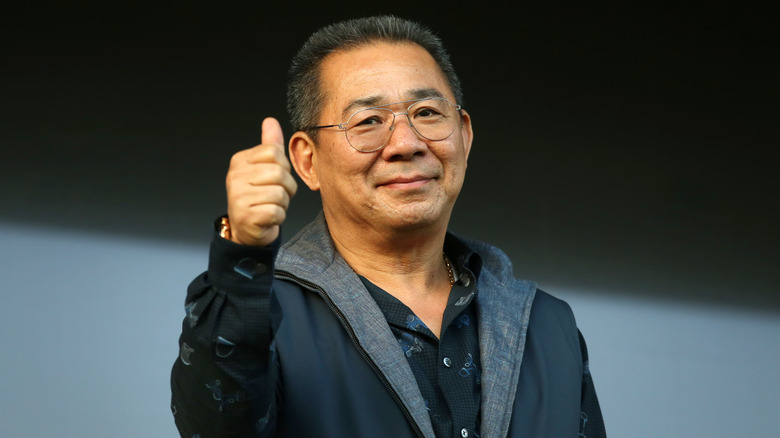Billionaires That Died In Tragic Accidents
Those who are not ultra-rich often harbor a fascination with those who are, and in recent years as the issue of income equality has become more prominent in public discourse, that fascination only seems to have grown. On the one hand, the mere existence of individuals who possess far more money than one person could ever possibly need in six or seven lifetimes can be understandably irksome. On the other, who wouldn't want to own a fleet of private jets, have their every whim catered to no matter the expense, or up and buy a social network if the mood struck them?
Given the decidedly mixed feelings toward billionaires on the part of the general public, there can be an odd mixture of sadness, morbid captivation, and (let's face it) a touch of schadenfreude when one is visited by serious misfortune. When the submersible Titan suffered a catastrophic implosion on its mission to visit the remains of the Titanic in June 2023, part of the reason the world was riveted had to do with the wealth of one of its ill-fated passengers: Hamish Harding, a British businessman, rumored billionaire, and veteran deep-sea explorer who perished in the craft at the age of 58. As it turns out, Harding was far from the first member of the super-wealthy elite to meet his end due to a tragic accident — because some things, like the favor of the machinations of fate, simply can't be bought.
James Crown
The name Crown might ring a bell if you're from Chicago; the family has been active in the city for over a century, with patriarch Henry Crown co-founding building materials firm Material Service all the way back in 1919. That company eventually grew into the largest worldwide distributor of such materials, but it's safe to say that the family didn't put all of their eggs in one basket. The Crowns have stakes in commercial property (Rockefeller Center), sports teams (the Chicago Bulls and New York Yankees), and ski resorts (Aspen Mountain and Snowmass), and collectively, their wealth is estimated by Forbes at over $10 billion.
It was during a trip to Aspen Motorsports Park in Woody Creek, Colorado, in June 2023 that James Crown — a Chicago fixture whose philanthropic endeavors and participation in the Civic Committee of the Commercial Club of Chicago had endeared him to the Windy City — was involved in a racetrack accident that resulted in fatal injuries. His father, Lester Crown, revealed to the Chicago Sun-Times that his son had lost control of the racecar he was driving as he negotiated a curve, slamming into a wall. No less of a prominent figure than Chicago Mayor Brandon Johnson was among those offering their condolences to the Crowns: "Jim truly embodied the soul of Chicago," Johnson said in a statement (per CBS News). "I send my deepest condolences to his wife, four children, grandchildren, and the entire Crown family and pray for their peace." Crown's fatal accident occurred on his 70th birthday.
Cyrus Mistry
The Mistry family are synonymous with construction in India; the family business, Shapoorji Pallonji Group, was founded by Pallonji Mistry all the way back in 1865. His son, Shapoorji, acquired a stake in the company known today as Tata Group. According to Forbes, that company boasts revenue of roughly $100 billion, with the Mistry family themselves worth about $16 billion. For a little context, Shapoorji Pallonji Group is the company that built the palace of the Sultan of Oman, and it still owns a considerable stake in Tata Group; that company has diversified holdings in auto, hospitality, and beverage brands — and for a time, Shapoorji's grandson Cyrus Mistry was its chairman.
Mistry was named to that position in 2012, but in a surprise move four years later, he was ousted after a vote of no confidence from the board; the dismissal was twice challenged in court to no avail. Just months later, he and three others were involved in an accident on one of India's notoriously shoddy highways about 60 miles outside of Mumbai, and 54-year-old Mistry and his friend Jehangir Pandole, a soft drink magnate, died at the scene. The tragedy brought renewed focus on the safety of India's roads, a longtime issue for the ridiculously populous country. According to Economic Times, India has the world's second-largest network of roads, which makes maintenance just a touch difficult — and in 2019, the last year before the COVID-19 pandemic put a dent in traffic, accidents on those roads were claiming lives at the rate of one every four minutes.
Petr Kellner
Like most fabulously wealthy people, Petr Kellner — who was the richest man in the Czech Republic — had his fingers in a lot of pies. He amassed a significant portion of his wealth by parlaying his investment fund into a majority stake in the largest insurer in his home country, but he also had interests in banking, technology, and real estate. At the time of his death in 2021, Forbes put his net worth at a dizzying $17.5 billion — and that death came in pursuit of the kind of thrills that only the very rich can afford to experience.
Kellner died while on a ski excursion in Alaska, braving the type of untouched terrain that can only be reached by helicopter. It wasn't a ski accident that claimed his life, however — his Airbus helicopter, chartered by the fabulously exclusive Tordrillo Mountain Lodge, went down near Knik Glacier, killing Kellner along with another guest, two guides, and the pilot. (David Horvath, a snowboarder also aboard the craft, survived.) The risks inherent in this type of skiing are self-evident, but in two separate lawsuits brought by Horvath and Kellner's family, it was alleged that Kellner and guide Gregory Harms should not have died; the pair survived the initial impact, but succumbed to their injuries while waiting for rescuers. Both suits allege that this was due to negligent monitoring and response — and authorities have admitted that they were not even aware of the crash for two hours, and help didn't arrive for over five. The litigation is ongoing as of this writing.
Chris Cline
In July 2019, billionaire coal magnate Chris Cline was hosting a party at his private island in the Bahamas in celebration of his birthday. The day before the big day, guests were arriving by helicopter, seaplane, and yacht, partying all day long and into the night — but around 11 p.m., the festivities hit a snag. Speaking with The Palm Beach Post, property manager Robert Hogan said it was then that he was told that Cline's 22-year-old daughter Kameron and one of her friends had fallen ill. Their condition was serious enough that transportation by helicopter was arranged to Fort Lauderdale, where they were to be admitted to the hospital; Cline accompanied the pair, along with two other young party guests and the two pilots, on what was to be a 30- to 40-minute flight. Minutes after takeoff, though, guests back on the island heard what sounded like a hard thud, and in the morning, the worst was confirmed — the chopper had taken a nosedive into the ocean, killing all aboard.
Unfortunately, the crash likely could have been avoided. The Post reported that according to transcripts of the pilots' conversation shortly before landing on the island, the craft had recently been experiencing a raft of mechanical problems, and probably never should have been in the air to begin with. In 2022, Cline's family filed a lawsuit against the helicopter's manufacturer alleging that it knew the pilots were not qualified to pilot the craft; as of this writing, the suit has yet to be resolved.
Joachim Herz
Joachim Herz was one of the richest people in Germany, and he was born into it: His father, Max Herz, was in coffee. That is to say, he was a founder of Tchibo, a titanic German chain of coffee houses that stock a wide array of ever-changing specialty goods, and also markets high-end home coffee brewers. After Max Herz's passing, Joachim and his siblings became involved in a "Succession"-esque struggle for control of the company, with Joachim and brothers Michael and Wolfgang in heated disagreement with brother Günter and sister Daniela over Tchibo's direction. Billionaires all, the family's squabbles captured the public's attention — but for Joachim's part, the battle came to an end after a tragic swimming mishap in 2008.
According to The Sydney Morning Herald, Herz was swimming in Lake Rabun in the U.S. state of Georgia (where he owned a home) when he found himself in an area where swimming was restricted, with no life jacket. He was struck by an 18-foot motorboat, and when the boater who struck him pulled him from the water, he was unresponsive; Herz had passed away at the age of 66. After his death, Tchibo dialed back some of its European retail operations — but soon came back with a renewed focus on its online presence, and today, consumers in the U.K. and U.S. can go online to get their hands on Tchibo's coffee beans and brewing machines.
Olivier Dassault
Olivier Dassault was the kind of public figure who was prone to raising a few eyebrows by his very existence. He was the billionaire son of Serge Dassault, the even-richer aircraft designer who inherited aviation company Groupe Industriel Marcel Dassault from his father; that company has a legacy of designing craft for use in warfare going back to World War I. Serge Dassault also purchased iconic French newspaper Le Figaro in 2004, and had holdings in auction houses and wineries — oh, and he was a conservative politician who was elected to the French senate in 2004. Serge Dassault passed away in 2018, and his son Olivier Dassault was a chip off the old block — inheritor of Serge's vast wealth along with his three siblings, president of the Strategy and Development division of the family company, and a representative in France's National Assembly who shared his father's conservative views.
In 2021, Olivier Dassault was returning from his vacation home in Normandy by helicopter when tragedy struck. The craft went down shortly after takeoff, killing Dassault and pilot Jean-Claude Bedeau, who had been instructing Dassault (a capable airplane pilot) on the craft's operation. According to The Times, the copter had taken off from an area not normally used for such things, and crashed after its rotor came into contact with a tree. Dassault was remembered fondly by French President Emmanuel Macron, who said in a tweet (via The Guardian), "[Dassault] never ceased to serve our country, to promote what was great about it. His brutal death is a great loss."
Tony Hsieh
The death of Zappos founder Tony Hsieh, who sold his online shoe company to Amazon for $1.2 billion in 2009, was as unusual as the man himself. Hsieh was a mohawk-sporting ball of energy who remained on to run Zappos at a salary of $36,000 per year after the sale; speaking with Forbes in 2017, he broke down the customer-focused approach to Zappos' success, touting the retailer as a company that "wants to be [your] friend." His death at the Connecticut home of his girlfriend in 2020 came under mysterious circumstances — and the more investigators searched for answers, the more mysterious it became.
Hsieh died when, in the wee hours of the morning, he became locked in a shed on the property — right before a fire started, the source of which is unknown. Investigators determined that after an argument, Hsieh had sequestered himself in the shed, which was later found to contain — in addition to flammable materials such as pool noodles and chairs — a partially disassembled propane heater, cigarette butts, and candles, any or all of which could have contributed to the blaze. Drug and alcohol paraphernalia were found in the shed as well, and it was further determined via security footage that Hsieh had apparently locked himself in the shed on purpose — and investigators could not rule out the possibility that he had deliberately set the fire that killed him (via The New York Times). Hsieh died in a burn center nine days after the incident; he was just 46 years old.
Ken Hendricks
Ken Hendricks made his multi-billion-dollar fortune in roofing, and it seemed to be in his blood; he told Forbes in 2006 that his first job, at the age of 12, was helping his father to remodel houses. The company he founded, ABC Supply Co., billed itself at that time as the largest wholesale distributor of roofing materials in the country, raking in over $3 billion yearly. It was solid, dependable roofing work that gave Hendricks his comfortable life — and in an ironic twist, it was inspecting roofing work that ended that life.
Hendricks was up on the roof of his Rock County, Wisconsin, home in December 2007, inspecting the construction work on the garage, when the roof gave way. Hendricks fell straight through, sustaining serious head injuries in the process; his wife, Diane, performed CPR while awaiting an ambulance, and Hendricks was transported to a local hospital before being transferred to Rockford Memorial Hospital in Illinois. He was pronounced dead there at the age of 66, leaving behind his wife and their seven children.
Wang Jian
Wang Jian was the billionaire chairman of HNA Group, a Chinese conglomerate with an unbelievable portfolio of holdings in industries as diverse as aviation, hospitality, tourism, and financial management. The company acquired stakes in so many operations so quickly that the Chinese government even had it under a microscope, and in 2021, it was reported that the company was facing bankruptcy after being virtually forced by said government to sell off a slew of assets and losing a staggering $10 billion to embezzlement. While Wang presided over a great deal of the company's acquisitions and eventual selling spree, he wasn't around to see its near-total collapse — because he died in a 2018 accident that can only be described as freakish.
As reported by The New York Times, Wang was visiting France on business when he decided to take a little time to go sightseeing. Happening upon an outcrop with a low wall above a cliff, he determined that a photo was in order, and asked a friend to take his picture as he mounted the wall, where he could get a good shot with the spectacular view as a backdrop. As his companion readied to take the picture, Wang simply tumbled backward, falling some 50 feet to his death. In the days following his death, The Times reported that Wang's untimely demise was bound to put even more financial strain on HNA as it was grappling with the burden of the not-always-profitable acquisitions he had masterminded — and indeed, it took over three years after his passing for the company to finish restructuring its debts to the satisfaction of the High People's Court.
Vichai Srivaddhanaprabha
Thai multi-billionaire Vichai Srivaddhanaprabha hit the road to riches in 1989, when he founded King Power, the company that would eventually become an absolute bully in the industry of duty-free retail stores. Starting with just one shop in Bangkok, Srivaddhanaprabha expanded his endeavor into one so dominant that it would require the intervention of the Thai government just to give other industry players a chance. In 2010, the businessman — who was a bit of a football fan — purchased the Premier League's Leicester City Club, and within half a decade or so, a couple of interesting things happened: Their stadium was renamed King Power Stadium, and the club shocked the U.K. by handily winning the only Premier League title in its history.
In 2018, Srivaddhanaprabha and four others were killed in highly public fashion when their helicopter went down right outside King Power Stadium, crashing into the corner of a parking lot and bursting into flames. A subsequent investigation attributed the crash to mechanical failure, and a Sky News cameraman who observed the accident revealed that somehow, the pilot had managed to guide the disabled craft toward an unpopulated area before crashing. The football club mourned their leader in a statement: "The world has lost a great man," it read. "A man of kindness, of generosity and a man whose life was defined by the love he devoted to his family and those he so successfully led. Leicester City was a family under his leadership.
